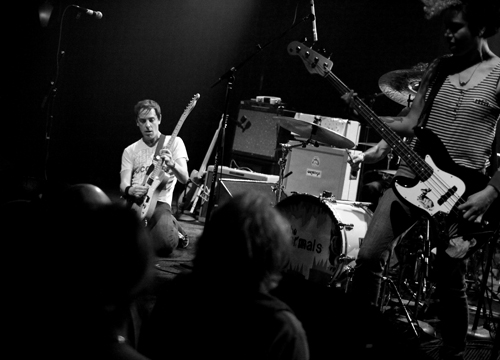The Thermals made their mark with noisy, adolescent, urgent post-pop-punk (their term) on 2003’s More Parts Per Million LP released on Sub Pop.
The Thermals

The Thermals made their mark with noisy, adolescent, urgent post-pop-punk (their term) on 2003’s More Parts Per Million LP released on Sub Pop.
“Hardly art hardly garbage,” the refrain from that album’s standout rock-a-long, “No Culture Icons,” pretty much sums it up. It eschews three chords for two and clean production for a heard-up-the-cellar-stairs sound. Tracks don’t exceed three minutes (as indeed they still rarely do), which—along with that production quality and borderline nonsense lyrics—prompt numerous comparisons to early Guided by Voices.
Things have changed a lot since then. Their latest full length album, Personal Life, was released in 2010 by Kill Rock Stars. Personal Life boasts the same urgency that marked their earlier work, a quality created as much by super-tight instrumentation as by singer/guitarist Hutch Harris’s nasal caterwaul, with cleaner production and somewhat more intelligible lyrics.
The three-piece—Kathy Foster plays bass and Westin Glass is their fourth drummer—just returned from playing with Helio Sequence and Nurses in Paris, and they were kind enough to make it a priority to answer some questions for the Vanguard.
The Thermals are famous, good-looking and nice—a trifecta not often found. They’re also predictably succinct. Here’s what guitarist/vocalist Hutch Harris had to say. My rambling, over-elaborate questions have been edited for length and clarity, as have their answers.
Vanguard: How was Paris?
Hutch Harris: Paris was great. We have toured Europe a ton in the past nine years. We love it. It was surreal having so many friends from Portland there—Brainstorm, Nurses, Helio Sequence, Mirah, etc. Crazy!
VG: I was reading up on some old reviews of Thermals albums, and a sentiment that I heard again and again was “childish,” or maybe “childlike,” or something like that, especially about Fuckin’ A. Do you agree with that “childlike” assessment?
HH: Fuckin’ A is definitely a childish record. It’s the sophomore record, get it? The title says it all. Other records we’ve done have been more “mature” or whatever. So there’s something for everyone in our catalog.
VG: On your site and in the press, you describe The Body, The Blood, The Machine as a political album, so it’s safe to call it that. Personal Life is described as…well, about personal stuff. Was it a conscious decision to tackle that dichotomy and maybe, in a sense, bridge it?
HH: We try not to describe TBTBTM as a political record. It’s a fantasy about how religion influences power. We try to give each of our records a different theme, but there’s not always a bridge from one to the next. There definitely was from TBTBTM to our next LP Now We Can See in that, at the end of TBTBTM, we “died,” and on NWCS we were “dead.” There’s not really a bridge from NWCS to Personal Life. We just wanted to do something different.
VG: What’s your view of the political landscape today? Bleak as ever?
HH: Yes, the political landscape is usually pretty bleak. It’s a scary world.
VG: Many artists of various persuasions are against the idea of providing explicit context or explanations for their work, of saying what it’s “about.” That doesn’t seem to bother you much. Is there a reason you make it all so explicit?
HH: People often misinterpret things, so sometimes you have to set them straight. Not always. We try not to be overly explicit. You shouldn’t have to explain art to people, but sometimes you need to correct them—or let someone else correct them—if they’re getting it wrong.
VG: The Thermals sometimes get described as a Portland super-group. How do you feel about that label?
HH: Well, we are the most famous, best-looking band in Portland, so we don’t mind it.
VG: There’s an arc to your discography, and it aims toward cleaner production, less noise, a more nuanced and adult sound. Is this the direction you’ll be heading? Is cleaner, more intelligible, more nuanced inevitable? Was there ever a band that began as a polished, symphonic producer of masterpieces that devolved into a three-piece cacophony of chaos?
HH: We are currently regressing back to a less polished, more chaotic sound. This is what people expect from us. It’s how they like us to be. Well, if it’s what you want, it’s what you’ll get.
VG: What’s the deal with keeping a drummer around?
HH: Drumming for The Thermals is not an easy job! It’s incredibly taxing on your mind and body. We’ve had a lot of great drummers. Westin [Glass, our current and permanent drummer] has been with us for over three years now, and he’s not going anywhere, I don’t think. He’s here to stay.
VG: Why is Hutch’s house called the Moss Motel?
HH: Because it was covered in moss. I moved out in 2005. They tore it down! It was seriously sinking into the dirt. I miss it!
VG: It seems like everyone has a question they want to ask famous musicians. What’s the dumbest question you’ve been asked in an interview? Feel free to say if it was one of these questions, even this one.
HH: Too many stupid questions to remember! Good thing I always have a stupid answer ready.
VG: Also, Eli at Trade Up Music wanted me to let Hutch know that they have more tube screamers in. Apparently, he goes through them like socks.
HH: Thanks. It’s true—I change tube screamers more often than I change my underwear.





